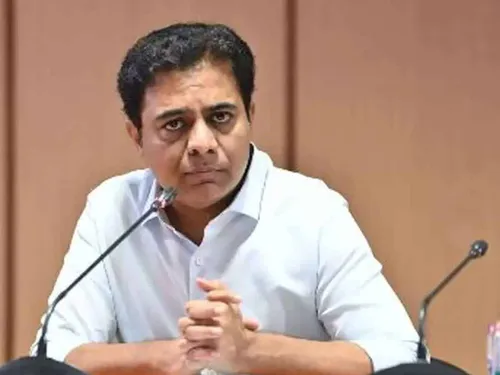Telangana’s IT Export Growth and KTR’s Role
Introduction
Telangana, the youngest state in India, has witnessed remarkable growth in its IT sector since its formation in 2014. The state has become a significant hub for information technology exports, contributing substantially to India’s digital economy. K.T. Rama Rao (KTR), the Minister for IT, Municipal Administration, and Urban Development, has played a pivotal role in this transformation. This essay delves into the growth of Telangana’s IT exports, the strategies employed by KTR, and the challenges and future prospects of the sector.
The Rise of Telangana’s IT Sector
Since its inception, Telangana has prioritized the development of its IT sector. Hyderabad, the state capital, has emerged as a major IT hub, attracting global tech giants and startups alike. The state’s IT exports have seen a steady increase, making it one of the top contributors to India’s IT export revenue. In the fiscal year 2022-23, Telangana’s IT exports were valued at approximately $20 billion, showcasing a significant growth trajectory.
KTR’s Vision and Strategic Initiatives
KTR has been at the forefront of driving Telangana’s IT growth. His vision and strategic initiatives have been instrumental in positioning Telangana as a preferred destination for IT companies. Some of his notable contributions include:
Table of Contents
- Infrastructure Development:
- T-Hub: Launched in 2015, T-Hub is one of India’s largest startup incubators, fostering innovation and entrepreneurship. It has created a vibrant ecosystem that supports startups with mentorship, funding, and networking opportunities.
- IT Parks and SEZs: The development of IT parks and Special Economic Zones (SEZs) in Hyderabad and other parts of Telangana has provided world-class infrastructure for IT companies. The HITEC City and upcoming IT parks in Warangal and other cities are examples of such initiatives.
- Policy Framework:
- TS-iPASS: The Telangana State Industrial Project Approval and Self-Certification System (TS-iPASS) is a pioneering policy that ensures speedy approval of industrial projects. This single-window clearance system has significantly reduced bureaucratic hurdles and attracted investments.
- ICT Policy: Telangana’s Information and Communication Technology (ICT) Policy focuses on creating a conducive environment for IT companies. It offers incentives such as tax benefits, subsidies, and support for research and development.
- Skill Development:
- TASK: The Telangana Academy for Skill and Knowledge (TASK) aims to bridge the skill gap by providing industry-relevant training to students and professionals. This initiative ensures a steady supply of skilled talent to meet the demands of the IT industry.
- Partnerships with Educational Institutions: Collaborations with top universities and institutes have facilitated the development of cutting-edge research and innovation in emerging technologies such as AI, blockchain, and cybersecurity.
- Promoting Innovation and R&D:
- WE Hub: A dedicated incubator for women entrepreneurs, WE Hub supports women-led startups and fosters gender diversity in the tech industry.
- RICH: The Research and Innovation Circle of Hyderabad (RICH) connects research institutions, academia, and industry to promote innovation and commercialization of research.
Challenges and Opportunities
Despite the impressive growth, Telangana’s IT sector faces several challenges.
- Competition:
- Domestic: Competing with established IT hubs like Bengaluru and emerging cities like Pune and Chennai requires continuous innovation and investment in infrastructure.
- International: Global competition demands adherence to international standards and the ability to attract multinational corporations amidst geopolitical shifts.
- Infrastructure:
- Urban Congestion: Rapid urbanization has led to challenges like traffic congestion and pollution in Hyderabad. Sustainable urban planning and the development of satellite towns are crucial to address these issues.
- Skilling and Reskilling:
- Emerging Technologies: The rapid pace of technological advancements necessitates continuous skilling and reskilling of the workforce. Initiatives like TASK need to expand their reach and scope to keep up with industry demands.
However, the opportunities are immense.
- Digital Transformation:
- Government Initiatives: Programs like Digital India and Smart Cities provide opportunities for IT companies to participate in large-scale digital transformation projects.
- Global Demand: The increasing global demand for digital solutions, especially post-COVID-19, opens up new markets and growth avenues for Telangana’s IT exports.
- Innovation and Startups:
- Vibrant Ecosystem: The presence of T-Hub, WE Hub, and RICH creates a robust ecosystem for innovation and entrepreneurship. Supporting startups in emerging technologies can position Telangana at the forefront of the global tech landscape.
- Strategic Location:
- Geographical Advantage: Located centrally in India, Telangana offers logistical advantages for businesses. Hyderabad’s well-connected airport and upcoming infrastructure projects enhance its accessibility.
Conclusion
Telangana’s IT export growth is a testament to the strategic vision and efforts of KTR and his team. The state’s focus on infrastructure development, favorable policies, skill development, and innovation has created a thriving IT ecosystem. While challenges remain, the opportunities for further growth are vast. Continued investment in infrastructure, innovation, and skilling will be crucial in maintaining Telangana’s competitive edge and ensuring sustainable growth in its IT exports. KTR’s leadership and the collaborative efforts of the government, industry, and academia will play a pivotal role in shaping the future of Telangana’s IT sector.








